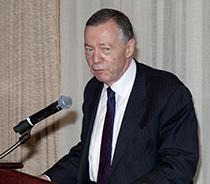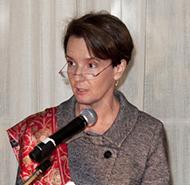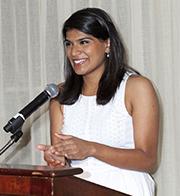Wolfgang Friedmann Memorial Award Presented to Human Rights Advocate Aryeh Neier
Co-founder of Human Rights Watch and President Emeritus of Open Society Foundations Honored for Outstanding Contributions to the Field of International Law
New York, March 31, 2014—Human rights advocates are part of a proud tradition reaching back more than a century to movements against slavery, said human rights champion Aryeh Neier at the Columbia Society of International Law’s March 26 Wolfgang Friedmann Conference at Columbia Law School. Neier accepted the annual Wolfgang Friedmann Memorial Award from the Columbia Journal of Transnational Law later that evening at New York City’s famous ‘21’ Club.
| Award recipient Aryeh Neier speaks on his legendary human rights career. |
A refugee from Nazi Germany, Neier has been a leading advocate for human rights for nearly half a century. After serving as national executive director of the American Civil Liberties Union for eight years, he co-founded and led Human Rights Watch as executive director for more than a decade. He was president of the Open Society Foundations for 19 years before stepping into his current emeritus role.
“Aryeh Neier’s career has been one of nervy risks, fierce principle, and pushing the boundaries of human rights advocacy,” said Sarah H. Cleveland, the Louis Henkin Professor of Human and Constitutional Rights and faculty co-director of the Human Rights Institute at Columbia Law School, who introduced Neier at the conference. “He is a visionary, he is courageous, he is determined, and—most importantly—he has been extraordinarily effective.”
| Professor Sarah H. Cleveland praises Neier to the audience at the 21 Club. |
“It is a particular pleasure to speak here because this law school had a disproportionate impact in pursuing civil rights and civil liberties litigation, and developing international human rights law,” said Neier, who has taught law at New York University, Georgetown University, the University of Siena, and the Paris School of International Affairs at Sciences Po.
Neier shared insights on the evolution of human rights movements, apologizing for reducing a complex history into shorthand, which he likened to “one of those plays that compress the complete works of Shakespeare into 45 minutes.”
“The mid-19th century fight against slavery was the first human rights movement because it was altruistic, about the rights of others, and necessarily international,” he said. “The movement emerged in its present form in the 1970s, about the time of the environmental and women’s movements, a period when everything internationally was dominated by the Cold War.”
Neier explained that the modern human rights movement coalesced when many people felt it equally important to condemn abuses from anti-communist and non-aligned regimes as those from within the Soviet bloc. With the end of the Cold War, he argued, the cause of human rights has gained momentum.
“The movement is growing, with a global character and a good deal of public support,” Neier said. “Between 1990 and 2009, 67 heads of state were prosecuted for human rights violations, unprecedented in human history.”
| Ramya Ravishankar '14, Editor-in-Chief of the Columbia Journal of Transnational Law, introduced Neier. |
The two events honor the memory of Wolfgang G. Friedmann, a legendary professor of international law at Columbia Law School and founder of the Columbia Journal of Transnational Law. Like Neier, he fled persecution in Nazi Germany and became a prominent voice for human rights and dignity. Friedmann taught at the Law School from 1955 until his untimely death in 1972.


